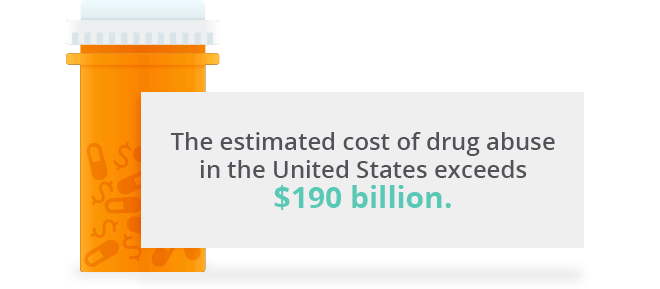A person may seem to make a voluntary choice to try a drug or begin a type of behavior, but a variety of genetic and environmental factors influence those decisions. Those factors increase or decrease the likelihood of an individual becoming addicted to that substance or behavior.
The disease of addiction can occur after ingesting drugs or alcohol or engaging in activities that stimulate the pleasure centers of the brain. It is exemplified by continued compulsive behavior that compromises a person’s health, career and relationships.
The brain of an addict physically changes when he or she continues the behavior driving their addiction, especially when the addiction involves drugs or alcohol. However, any stimulating behavior can cause changes that lead to addiction.
“Most drugs start off being rewarding,” former National Institute on Drug Abuse Director Dr. Glen Hanson told DrugRehab.com. “That gets the person interested in them… As the addiction proceeds, then some of that shifts. It goes from the reward being the attraction to a compulsive behavior. Compulsive behaviors aren’t necessarily rewarding behaviors.”
Addiction, whether in the form of substance use or other behavior, usually begins with a positive experience. However, the high that drugs give a drug user or the thrill that compulsive behavior gives an addict eventually result in negative long-term consequences that outweigh any short-term benefit.
Laura Clarke of The Recovery Village gives advice to people battling alcohol or drug addiction.

What Are the Different Types of Addiction?
Addiction can be either behavioral or substance related. An intense feeling of emotional need or physical craving characterizes them both. Both types of addiction carry a number of other similarities, but behavioral addiction does not possess the same physical symptoms that accompany drug addiction. Experts disagree on the similarities and differences between the symptoms and consequences of the types of addictions.

Drug Addiction
Drugs are addictive substances that change the way the body — the brain in particular — handles communication and processes information. Long-term drug use causes physical changes in the brain that lead to a substance use disorder. Different drugs affect the body differently.
Stimulants, such as tobacco, cocaine or prescription amphetamines, stimulate the brain and nervous system, causing increased alertness. Depressants, such as barbiturates and benzodiazepines, slow activity in the brain and nervous system, causing relaxation. Hallucinogens, such as LSD and PCP, drastically disrupt the way the brain and nervous system communicate, causing hallucinations.
Alcohol Addiction
Alcohol addiction is often referred to as alcoholism or an alcohol use disorder. It’s one of the most common addictions in the United States, with an estimated 16.6 million suffering from the disease. Alcohol addiction occurs when regular, excess drinking causes harm or distress.
- Alcohol dependency and alcohol abuse
- Once categorized as separate disorders, now commonly referred to as an alcohol use disorder.
- Binge drinking
- Occurs when an individual consumes a high amount of alcohol, between four and five drinks, in a single day.
- Heavy drinking
- Occurs when an individual consumes five or more drinks on five different occasions in a single month.
Learn more about alcohol addiction
Illicit Drug Addiction
Illicit drugs are outlawed substances consumed by individuals trying to obtain a high, altered perception of reality or feelings of relaxation and happiness. The drugs cause desired short-term disruptions in the brain, but they also cause undesirable long-term changes to the brain and other vital organs in the body, leading to drug addiction.
- Marijuana
- Heroin
- Cocaine/crack
- Synthetic drugs such as bath salts and spice
Prescription Drug Addiction
Prescription drugs are approved medications used to treat symptoms of diseases and other medical conditions. Even when used as prescribed, they can cause physical changes that can lead to addiction. When they’re used in any way other than as prescribed by a doctor, the likelihood of prescription drug addiction drastically increases.
- Opioids, including oxycodone and hydrocodone.
- Benzodiazepines, such as Xanax and Valium.
- Amphetamines, such as Adderall and Ritalin.
- Sedatives, including Ambien and Lunesta.
Learn more about prescription drug addiction
Behavioral Addiction
As with drugs, certain behaviors cause brief feelings of happiness or euphoria. However, some long-term behaviors cause a person to lose control of their actions. People suffering from these addictions experience symptoms similar to those of drug addicts, including cravings, tolerance, withdrawal and relapse.
- Gambling
- Sex
- Eating
- Internet
- Shopping
- Video Games
Multiple Addictions and Co-Occurring Disorders
Research indicates people who suffer from substance abuse disorders are very likely to suffer from
co-occurring mental health disorders and vice versa. An individual can suffer from a behavioral addiction, a drug addiction and a mental health disorder all at the same time.

How Is Addiction Recognized?
Addiction affects people differently. The visible and invisible
symptoms of addiction differ depending on the drug or behaviors causing the addiction, but most addictions cause a person to act differently. A person’s appearance may change. They may take more risks, neglect regular activities and begin having problems with personal relationships.
Brett Watson, in recovery from addiction, discusses how he recovered from addiction.
How Is Tolerance Different from Addiction?
Tolerance refers to a physical adaptation within the body in which an individual requires a higher amount of drugs — or a greater amount of behavioral activity — to achieve the same effect. It is a common symptom of addiction, but an increased tolerance does not always mean addiction is present.
How Is Physical Dependency Different from Addiction?
Dependency is a physical adaptation in which the body craves a substance or behavior in order to function normally. Dependency is often accompanied by an increase in tolerance. It is also a common symptom of addiction, but someone can be dependent on a drug without being addicted to it if it does not cause compulsive, harmful behavior.
What Is a Functioning Addict?
High-functioning addicts are people who suffer from a drug or behavioral addiction but are still able to perform at a high capacity in work, social or other settings. However, they are negatively affected by their addiction despite their appearance. They may suffer less obvious consequences of addiction, such as financial or health problems.

What Causes Addiction?
A number of factors contribute to addiction. On the surface, addiction is caused by physical changes in the brain that make the body crave certain substance or behaviors and react negatively when it doesn’t receive it. However, genetic and environmental risk factors contribute to addiction on a deeper level.
Genetic Risk Factors
Addiction runs in families. More than 100 genetic traits that increase someone’s risk for addiction have been discovered. They range from genes that affect the way someone physically responds to a substance to genes that influence compulsive and risky behavior.
Environmental Risk Factors
Environmental risk factors play almost as much of a role in addiction as genetics. Children raised in high-risk environments — for example, homes in which drug use is common or stress is high — are more likely to develop an addiction later in life, as are people exposed to traumatic events.

What Are the Symptoms of Addiction?
Drugs and compulsive behavior can cause both positive and negative consequences in the short term. Addiction begins when negative long-term symptoms begin to develop.
In 2013,
54.1 percent
of new illicit drug users were under 18 years of age.

Source: National Institute on Drug Abuse
Physical
Increased tolerance and dependency are common physical symptoms of addiction. Other physical symptoms include decreased energy and ability to focus. Addiction can also cause problems with blood pressure, heart rate and memory.
Emotional
People who suffer from addiction often feel withdrawn from life. They lose interest in hobbies and activities they once found enjoyable and disconnect from friends and family. Feelings of sadness, loneliness and desperation are common.
Psychological
Addicts often participate in high-risk behaviors to support their addiction. Their mental health suffers because addiction worsens existing mental health disorders or causes new ones.
Suicide rates are high among addicts.
Struggling with an addiction?Get a recovery plan that’s made for you.
What Are Other Complications of Addiction?
Addiction eventually becomes the most important thing in an addict’s life, and maintaining the addiction becomes their top priority.
 Addiction
Addiction
 Treatment
Treatment
 Faith & Religion
Faith & Religion
 Active Recovery
Active Recovery
 Our Community
Our Community










